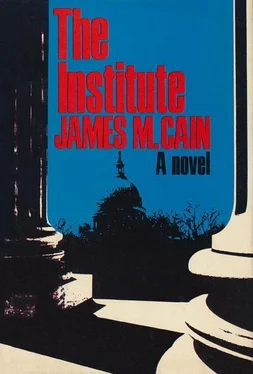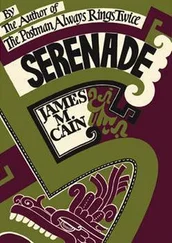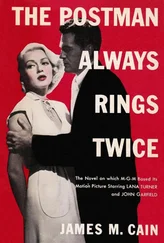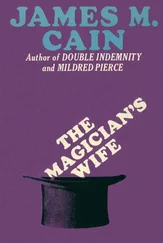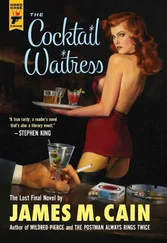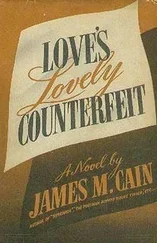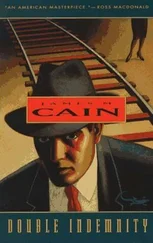“It’s like being given a scuba outfit and told to find the lost Atlantis,” he said. “And it also sounds like Richard Garrett, who is in the habit of commanding things to be done forthwith, and then, presto whango, they are... sometimes.” Suddenly the grin left his face, as though Marcel Marceau had waved his hand across it, and he started snapping his finger at the girl. “Miss,” he said when she sashayed over, “I’m Senator Hood of Nebraska, and something has come up. We have to leave. We’ll be gone about a half-hour. When we come back, we will want our lunch ready exactly as we ordered it. Keep our table for us, please.”
“Yes, sir,” she said as he pressed a bill in her hand.
“What is it, Senator?” I asked, wondering if he were ill.
“You’ll see. Come on, Lloyd.”
We went upstairs and out on the street. A taxi stopped for us as soon as he had raised his hand. He gave an address on K Street, and when we got there he told the driver to park, “here by the curb — we want to sit for a minute and then go back where we came from.” Through the window he pointed at the building across the street. It was still under construction. Scaffolding was all around it and out over the sidewalk. It was a beautiful modern thing of sandstone. But it wasn’t one of those buildings that look like a refrigerator with windows cut in the sides. It had windows, of course, but they were spaced in a graceful way, with stone in between. I counted ten floors. The top two were set back in a kind of mansard style, a little like the Lincoln Memorial. The entrance was beautiful — no columns, no fancy stuff, just two large bronze doors. He stared and then said quietly: “How would that do for your institute?”
“Perfect! Wonderful!”
“Let’s go back to Harvey’s, driver.”
While we rode, he talked. “You’ve heard of Bagastex?”
“I’ve heard of bagasse.”
“That’s right — Bagastex is made of bagasse — that stuff they get when they grind the juice out of sugarcane. It’s a floor covering that was developed by the Tombigvannah Corporation in Georgia. They tooled up, spent millions on it, and put up that building there, the one you just looked at. They had it made, they thought. By the end of the year they were due to line up with the big ones. And then the boom got lowered. Bagastex didn’t sell. Meanwhile, in Georgia they had had the bad judgment to fudge on their taxes. They knew they could be heading for trouble but figured that with the money they’d be making, they could square up and get on with the show without being caught. But they couldn’t. And they can’t meet their installment here, their last one on the building, with the contractor. So tomorrow in court the contractor will sue to have them declared bankrupt so their assets can be impounded and their creditors paid — perhaps. How do I know this? A certain senator came to me for help in getting a postponement tomorrow. But I can’t do a thing. There are reasons why I simply don’t dare to. But you can do something. You can phone Richard Garrett and have him get on it quick. It’s the chance of a lifetime, to pick up a building dirt cheap and perhaps do more than that. So, get on it. But remember: keep me out of it !?”
“I hear you, Senator. O.K.”
Back at Harvey’s, he paid for the cab. When we returned to our table, the maîtress d’ was there, looking at her watch.
“You were gone twenty-five minutes,” she said to the senator. “I’ll tell teacher to give you an apple.”
“Honey, I love you,” he told her.
He had her bring a phone and phone box, and we looked the numbers up, especially Tombigvannah’s lawyer, a man named Downing, who had offices in the Pell Building on Fourteenth Street. I wrote everything down on the four-by-six cards a researcher invariably carries and finally put in a call to Wilmington. Miss Immelman transferred my call to Mr. Garrett’s office. He was friendly and interested in what I was calling about. “It’s a beautiful thing,” I assured him and described the building. “It’s really something. How much of it I’ll need, I don’t know right now — two floors at least, perhaps three. But the other floors, you can rent out.” But when I tried to explain the deal and mentioned Tombigvannah, he cut in quickly and hard.
“I know all about that. They’ve been propositioning me about Bagastex for a couple of years at least, and, of course, I’ve had it looked into. But the next question concerns you. What’s your connection with it?”
“I don’t have any connection.”
“Where’d you get your information?”
“That, I’m not free to divulge, Mr. Garrett.”
“Dr. Palmer, I have to know.”
“Why?”
“For one thing, there can be no secrets between us — not on this can there be. And for another, I have to be sure you’re not being used as a catspaw.”
“A what?”
“A means to an end.”
“You mean, I could have been fed this tip as bait, so I would pass it on to you, and—”
“Exactly.”
“I assure you, it’s nothing like that.”
“You think it’s nothing like that.”
When I hung up, the senator, who had heard, shook his head gloomily. “I’m sorry, Lloyd,” he said, “but I had to sew it up. I couldn’t help it. There are things I can’t go into. It could cost me my seat to get mixed up in this mess.... Well, thanks for standing pat. I’d have expected it of you. Can’t say more than that.”
The food came and I ordered a bottle of Chablis, but he said: “Make it a split.” When the waitress brought it, she also brought the phone back, saying: “Long-distance call, Dr. Palmer. My, but you’re busy today.”
It was Mr. Garrett again. When I expressed surprise that he knew where I was, he said: “I called Hortense to find out what she knew, and she didn’t know anything except where you were and who with — which, of course, cleared up one thing right away. But while I was talking to her, Miss Immelman brought me the file, the stuff I have on Bagastex, and right now I’m looking at a memo I hadn’t seen before which makes it a whole new ball game — and how. So, Lloyd, once again, you’ve done it. Now let me talk to the senator.”
I hesitated a moment and then said: “I’ll see if he’s still here.”
Cupping my hand over the phone, I said to Senator Hood: “Do you want to talk to him? He found out I’m with you, from Hortense.”
“O.K., Paul Pry,” the senator said, taking the phone; “I’ll give you what help I can. But don’t quote me and don’t record this call. Is the bug on or off?... O.K., what do you want to know?”
He answered questions in a quick, straight-from-the-shoulder way, and I got a glimpse of the enormous body of knowledge a big shot has to have to be a big shot. I also got a glimpse of one of the crookedest deals I’ve ever heard of — a scheme with forty angles, to defraud investors, growers, creditors, contractors, machinery manufacturers, and the government. I understood at last why he couldn’t get mixed up in it. Finally he was done and handed the phone back to me.
“Lloyd,” Mr. Garrett said in a very friendly tone; “you did the right thing in protecting the senator until he chose to break silence. On that part, no hard feelings. I’ll be down in a couple of hours to look this building over, and if I like it, I’ll move in — or try to. So will you stand by at home for my call in case I need you? And will you tell Hortense I’m on my way?”
“You want this dope I have? The lawyer and so on?”
“I’ll have Miss Immelman take it.”
I got home around three and called Hortense. I told her that Garrett was on his way to Washington, but that left us dangling. We would have to stand by as we were, with no idea when we could see each other, and especially whether we could. But we had reached the point where we hungered for those nights, and I told her: “I feel funny inside, as though a vacuum were there.”
Читать дальше
